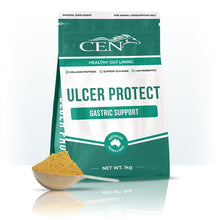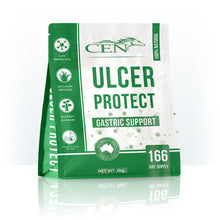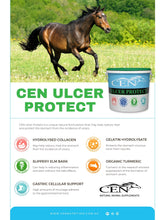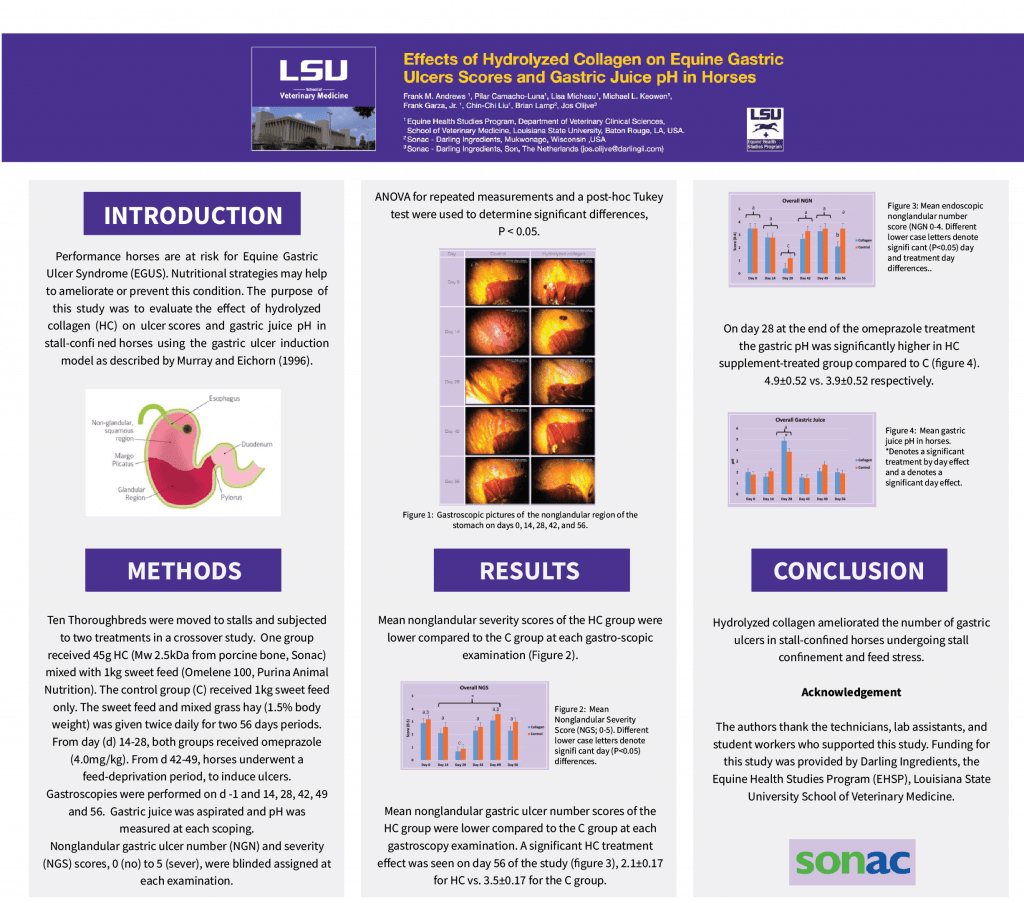Description
A unique natural ulcer supplement for horses featuring a formulation that may assist reduce, heal and protect the stomach from the incidence of ulcers. Using high-quality natural ingredients does not inhibit the natural acid pump action as stomach acid is essential for protein digestion and absorption of vitamins and minerals.
The horse’s natural stomach acid also acts as a barrier against micro-organisms and parasites entering further down the digestion system.
Key Features
- Healthy Gut Lining Support
- Ulcers Healing
- The Elimination of Ulcer Formation in the Stomach
- Increase Absorption of Vitamins and Minerals such as Calcium and Magnesium
- May Help Decrease Squamous Ulcer Scores
- May Reduce the Likelihood of Gastric Scarring
Feed Rate
| Maintenance | Ulcers Present |
|---|---|
| Mix with feed 30g/day (1 full scoop) for 500kg horse. Can be split 15g per meal. | Feed 60g/day (2 full scoops) |
Benefits
-
Formulated By Nutritionists
Trusted by over 7,500 happy horses and owners.
-
Australian-Made Since 2014
Proudly Australian Made & Owned, manufacturing all our products in Australia.
-
All Natural Ingredients
All our products are Chemical Free. We only use natural sources.
Hydrolysed Collagen Peptides
Studies into the effectiveness of Hydrolysed Collagen Peptides for Ulcers in horses has shown that Hydrolysed Collagen-fed horses had fewer and less severe ulcers throughout the trial. Significantly fewer ulcers were seen after 56 days of feeding. Hydrolysed Collagen also lowered the severity of gastric ulcers in stall-confined horses undergoing stall confinement and feed stress (Hydrolysed Collagen And Ulcer Study).
Gastric Cellular Support
Fermented Legume by Lactobacillus delbrueckii lactis Rosell 187 may help decrease squamous ulcer scores in horses (Fermented Legume Study).
Organic Tumeric
Turmeric in the research showed suppression of the formation of stomach ulcers when fed daily to horses (Turmeric Study).
Slippery Elm Bark
Contains high amounts of mucilage that adheres to the gastrointestinal tract, soothing and coats injured and inflamed tissues, helping them to heal and reducing the likelihood of scarring, as well as drawing out toxins and irritants.
Gelatin Hydrolysate
Gelatin’s short peptides – glyprolines – consist of amino acids of glycine and proline. They protect the stomach mucous tunic from injuries. Glyprolines are easily absorbed in the stomach and remain in the blood for a long time without breaking up. They act not only on the stomach cells but also on the central nervous system overcoming the blood-brain barrier, therefore they help prevent the ulcers caused by stress.
The Difference Between CEN Ulcer Protect and Ulcer Medication
Ulcer medications (e.g Ulcerguard) turn down/block acid production in the horse’s stomach (proton pump inhibitor). CEN Ulcer Protect does not inhibit the natural acid pump action. It helps protect and heal the stomach wall with high-quality ingredients without side effects. Stomach acid is vital for protein digestion and absorption of key vitamins and minerals such as calcium and magnesium. The acid in the stomach is also important as a barrier against micro-organisms and parasites in the environment entering further down the digestive system. Ulcers in horses can occur in the Foregut and Hindgut. Long term use of ulcer medication can be risky. Evidence from human research that long term use of Omeprazole impacts calcium absorption, which has been linked to an increased risk of osteoporosis where bones become weak and there is the risk of fracture. Short term use would be a lower risk. This has caused some nutritionists and researchers in equine nutrition to question the long term use of Omeprazole in horses. Dr. Juliet Getty – internationally respected independent equine nutritionist, believes that concerns are reasonable because what happens in a horse’s stomach is not that different from human digestion.
“What happens in humans is that these medications not only reduce protein digestion, but they also inhibit the absorption of key minerals and vitamins, such as magnesium, calcium, vitamin D, and vitamin B12” said Getty.
Science Reference
(1) Pre-Treatment with Turmeric (C. Xanthorrhiza) Reduces the Severity of Squamous Gastric Ulceration in Feed Restricted Horses – SPS Fletcher1,2* and SL Gough1 (2) https://theequinereport.com/2017/11/hydrolyzed-collagen-a-supplement-to-maintain-stomach-health/ (3) https://www.sciforschenonline.org/journals/animal-science-research/article-data/JASR125/JASR125.pdf
Written By:
Bryan Meggitt (BMedSc. GCrtMedSc.)
Co-Founder / Blood Scientist | CEN Nutrition
Ingredients
Hydrolysed Collagen Peptides, Gelatin Hydrolysate, Fermented Legume by Lactobacillus delbrueckii lactis Rosell 187, Slippery Elm Bark, Live Probiotics, Organic Turmeric, Stabilised Linseed Meal.










